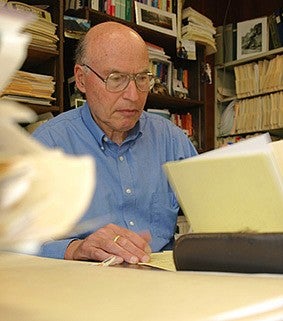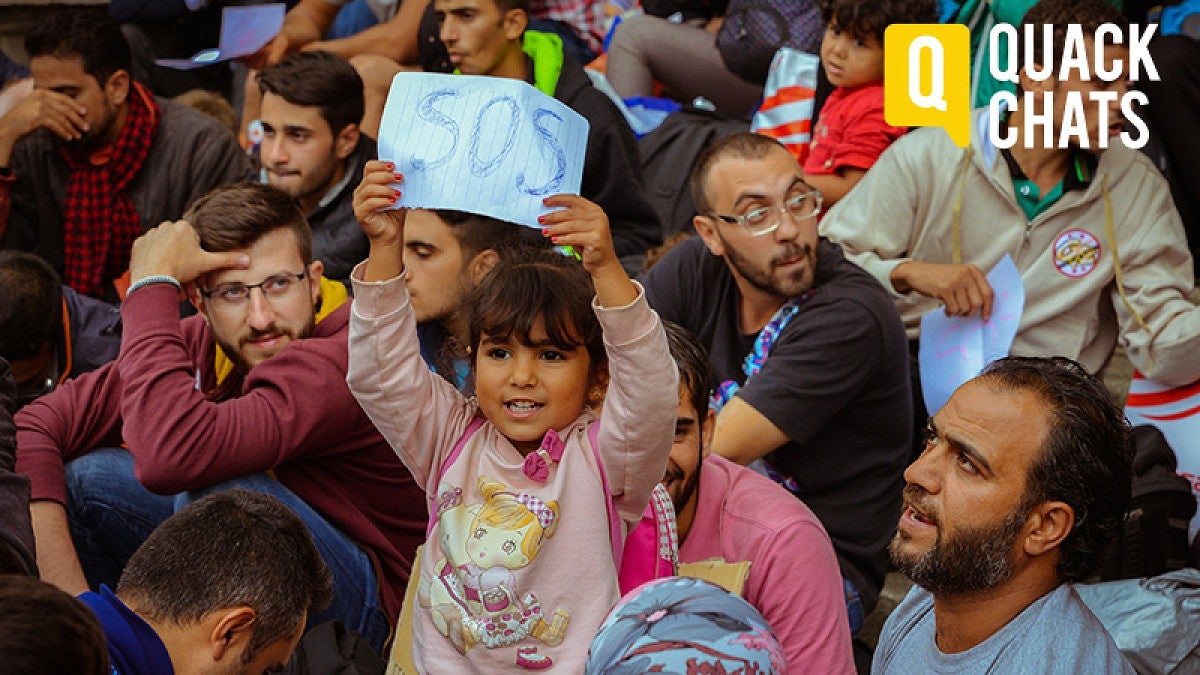The foundation of Paul Slovic’s Quack Chats pub talk April 26 may seem unsettling. However, the UO psychologist sees his message as a road map to solving the "flawed arithmetic of compassion" that emerges in responding to mass human tragedies such as those in Rwanda, Darfur and Syria.
In Syria, more than 500,000 lives have been lost — 200,000 of them civilians — in the nation’s long-running civil war. As death tolls mount in such scenarios, Slovic’s research repeatedly has found, the willingness of people to help becomes muted.

“We numb over to big numbers,” said Slovic, who also is a co-founder and president of Decision Research, a Eugene-based nonprofit dedicated to helping individuals and organizations address the often risky decisions of modern life. “One death is a tragedy; a million deaths is a statistic.”
Case in point from a Slovic-led study: the photograph of a Syrian child lying face down on a Turkish beach, seen on the front pages of newspapers around the world in September 2015. After the photo appeared, donations to the Swedish Red Cross rose from $8,000 to $430,000 a day for a while before support faded.
“A wrenching image catches our attention, stirs our emotions and makes us want to do something,” Slovic said. “Over time, though, the image fades, emotion wanes and so does action.”
Confronting this flawed arithmetic of compassion, in which the value of protecting more than one life at risk feels less serious, is of critical importance for individual decision-making and for guiding national and international policy in a world facing catastrophic threats from violence, disease, poverty and natural disasters, he said.
“Feelings are not enough,” he said. “We need careful analysis of the crisis and a menu of action options.”
Slovic, elected as a member of the National Academy of Sciences last year, also will tell how his research was influenced by his friendship with Israeli researchers Daniel Kahneman, a Nobel Prize-winner in economics, and Amos Tversky. The two spent a year, 1971-72, in Eugene and are the focus of the new book “The Undoing Project.” The two researchers, Slovic said, helped show that the “things we value are not based on their absolute values as much as their relative values, a tendency that undermines compassion.”
His Quack Chats talk, “Genocide and the Arithmetic of Compassion” will begin at 6 p.m. at the Erb Memorial Union’s Falling Sky Pizzeria. It is free and open to the public.
Participants are encouraged to ask questions and engage in a conversation with the researcher during the presentation. The talk is part of a series of events that falls under the umbrella of Quack Chats, a public outreach initiative led by University Communications.
Upcoming Quack Chats:
Run with a Researcher, another opportunity to engage in discussions with UO researchers, returns Saturday, April 29, with a special Spring Family Weekend edition. Participants can run or walk with a researcher by meeting up at 8 a.m. at the Erb Memorial Union’s “O” Desk. No advance registration is required.
Pub talks next month will feature UO faculty members Terry Hunt, Patrick Phillips, Nelson Ting and C.J. Pascoe.
Hunt will speak on “Rethinking the ‘Mystery’ of Easter Island” at 6 p.m., May 3, at Marketplace@Sprout!, 418 A St., Springfield, as part of the Museum of Natural and Cultural History’s Ideas on Tap series.
Phillips, acting executive director of the Phil and Penny Knight Campus for Accelerating Scientific Impact, will address “Science at the Nexus of Life and Death” at 7 p.m., Tuesday, May 9, at the John G. Shedd Institute for the Arts, 868 High St., Eugene.
Ting, an anthropologist, will speak on “Primates Going Extinct” at 6:30 p.m., May 11, at Whirled Pies at Cozmic, 199 W. Eighth Ave., Eugene, as part of the Oregon Museum of Science and Industry’s pub talk series.
On May 24, the topic for Pascoe, a sociologist, will be “Is It Getting Better? Homophobia in High School,” beginning at 6 p.m. at Falling Sky in the EMU.
To help keep upcoming events on your calendar, see the Quack Chats webpage.
—By Jim Barlow, University Communications


